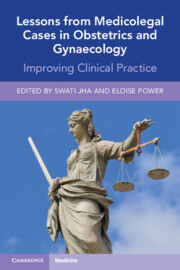Book contents
- Lessons from Medicolegal Cases in Obstetrics and Gynaecology
- Lessons from Medicolegal Cases in Obstetrics and Gynaecology
- Copyright page
- Dedication
- Contents
- List of Contributors
- Preface
- Foreword
- Chapter 1 Recent Trends in Clinical Negligence Claims in England
- Chapter 2 From Complaint to Litigation
- Chapter 3 Being a Medicolegal Expert and Report Writing
- Chapter 4 Consent: Legal and Clinical Implications
- Chapter 5 Prenatal Diagnosis, Screening and Wrongful Birth
- Chapter 6 Obstetric Perineal Trauma
- Chapter 7 Medical Disorders of Pregnancy
- Chapter 8 Fetal Growth Restriction and Unexplained Stillbirth
- Chapter 9 Fetal Monitoring and the Challenges of Identifying the Fetus at Risk of Intrapartum Hypoxia
- Chapter 10 Shoulder Dystocia
- Chapter 11 Obstetric Haemorrhage and Retained Products of Conception
- Chapter 12 Infection and Sepsis in Pregnancy
- Chapter 13 Caesarean Section Including Uterine Rupture and Full Dilatation Caesarean Deliveries
- Chapter 14 Assisted Vaginal Birth
- Chapter 15 Breech Presentation and Delivery
- Chapter 16 Multiple Pregnancy
- Chapter 17 The Cervix: The Nemesis of Obstetrics and Gynaecology
- Chapter 18 Hysterectomy for Heavy Menstrual Bleeding
- Chapter 19 Endometriosis
- Chapter 20 Miscarriage and Ectopic Pregnancy
- Chapter 21 Ovarian Surgery, Menopause Hormone Therapy and Contraception
- Chapter 22 Incontinence Surgery and Bladder Care
- Chapter 23 Vaginal Prolapse
- Chapter 24 Subfertility and Assisted Conception
- Chapter 25 Gynaecological Precancer
- Chapter 26 Gynaecological Malignancy
- Index
- References
Chapter 24 - Subfertility and Assisted Conception
Published online by Cambridge University Press: 22 April 2022
- Lessons from Medicolegal Cases in Obstetrics and Gynaecology
- Lessons from Medicolegal Cases in Obstetrics and Gynaecology
- Copyright page
- Dedication
- Contents
- List of Contributors
- Preface
- Foreword
- Chapter 1 Recent Trends in Clinical Negligence Claims in England
- Chapter 2 From Complaint to Litigation
- Chapter 3 Being a Medicolegal Expert and Report Writing
- Chapter 4 Consent: Legal and Clinical Implications
- Chapter 5 Prenatal Diagnosis, Screening and Wrongful Birth
- Chapter 6 Obstetric Perineal Trauma
- Chapter 7 Medical Disorders of Pregnancy
- Chapter 8 Fetal Growth Restriction and Unexplained Stillbirth
- Chapter 9 Fetal Monitoring and the Challenges of Identifying the Fetus at Risk of Intrapartum Hypoxia
- Chapter 10 Shoulder Dystocia
- Chapter 11 Obstetric Haemorrhage and Retained Products of Conception
- Chapter 12 Infection and Sepsis in Pregnancy
- Chapter 13 Caesarean Section Including Uterine Rupture and Full Dilatation Caesarean Deliveries
- Chapter 14 Assisted Vaginal Birth
- Chapter 15 Breech Presentation and Delivery
- Chapter 16 Multiple Pregnancy
- Chapter 17 The Cervix: The Nemesis of Obstetrics and Gynaecology
- Chapter 18 Hysterectomy for Heavy Menstrual Bleeding
- Chapter 19 Endometriosis
- Chapter 20 Miscarriage and Ectopic Pregnancy
- Chapter 21 Ovarian Surgery, Menopause Hormone Therapy and Contraception
- Chapter 22 Incontinence Surgery and Bladder Care
- Chapter 23 Vaginal Prolapse
- Chapter 24 Subfertility and Assisted Conception
- Chapter 25 Gynaecological Precancer
- Chapter 26 Gynaecological Malignancy
- Index
- References
Summary
The claimant was diagnosed with testicular cancer and prior to receiving treatment, as this would render him infertile, deposited three samples of semen in the defender’s facility. The sperm was deposited to preserve his ability to become a father following the treatment through IVF. However, due to a mishap with the storage vessel and resultant inability to safely use the semen provided, he claimed for the loss of the chance of fatherhood and compensation for the distress and depressions arising from this.
- Type
- Chapter
- Information
- Lessons from Medicolegal Cases in Obstetrics and GynaecologyImproving Clinical Practice, pp. 305 - 316Publisher: Cambridge University PressPrint publication year: 2022



